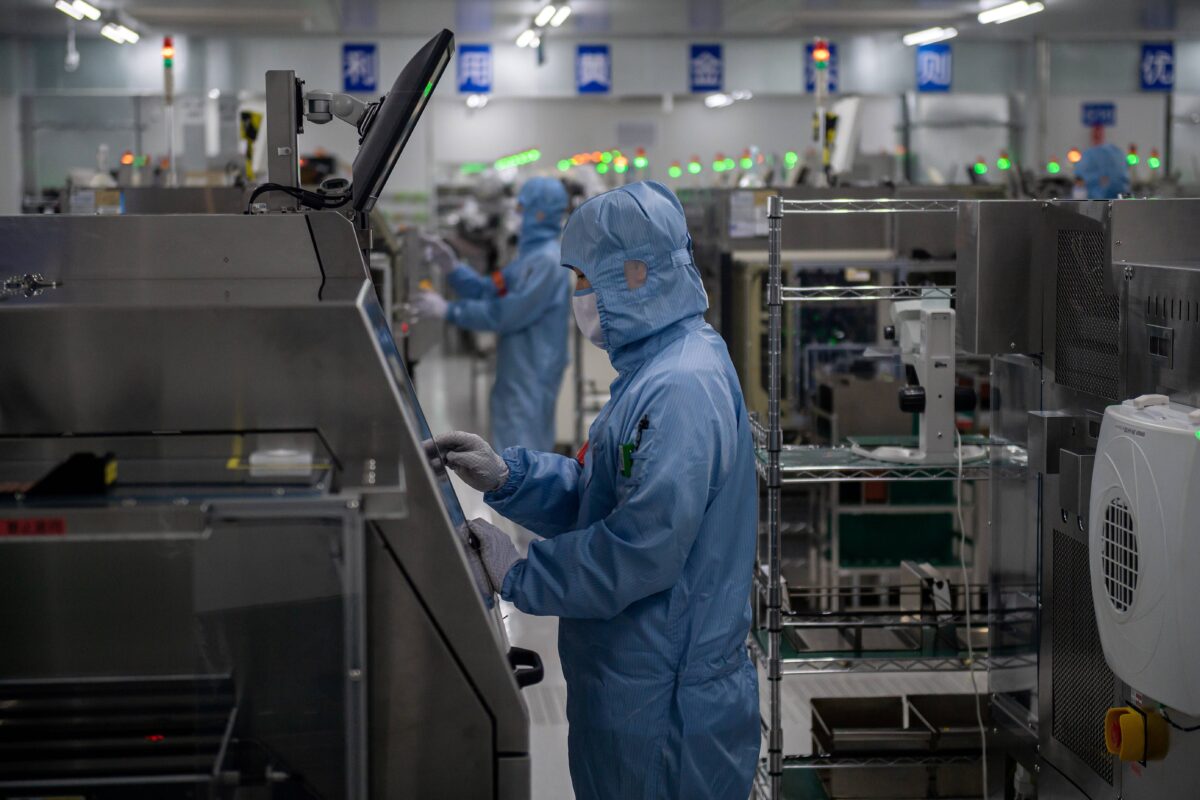Dueling US-China Economies
Commentary China’s arbitrary imprisonment of top business leaders is a self-defeating weakness that can be exploited by the United States and our allies globally. This strategic failure by Beijing, and all communist societies, is replicated by its allies, including Russia and Venezuela. It could be a fleeting and lucrative window of opportunity for democracies in an era of globalization, which facilitates capital flight and could help the reindustrialization of advanced democracies. But the opportunity could fade just as quickly and arguably already has. China’s Chip Slip On March 23, Beijing released Chen Datong, a leading computer chip investor who spent eight months in detention just as China sought to sanction-proof its tech industry with domestically-manufactured semiconductors. Chen’s $1.5 billion company, Hua Capital, has invested in over 150 semiconductor companies in China. It was “at the forefront of Beijing’s efforts to jump-start its domestic chip production,” according to the Financial Times. Hua was among the many recipients of $47 billion in subsidies from the Chinese regime to end reliance on foreign chip design and fab facilities. However, the massive seed funding failed to yield any major breakthroughs. Workers are seen inside the production chain at a semiconductor manufacturing factory in Beijing on May 14, 2020. (Nicolas Asfouri/AFP via Getty Images) Over a dozen semiconductor officials and executives were arrested as a result. Their detention hurt China’s technology development not just due to the removal of Chen, but from the chilling effect it had on other technology investors and developers, including domestically and from abroad. Brain Drain From Russia Also that week, Russian President Vladimir Putin’s ally, Dmitry Medvedev, “threatened to arrest Russian weapons producers if they didn’t work faster,” according to The Wall Street Journal. It wouldn’t be the first time that executives were arrested in Russia. Moscow arrested its wealthiest man, oil magnate Mikhail Khodorkovsky, in 2003 after he founded “Open Russia” to build upon civil society in the country. Khodorkovsky spent 10 years in a labor camp before exile in Switzerland and then the United Kingdom. There he expanded upon his activities with other prominent Russians, including advocacy for Putin’s removal and the country’s democratization. In an interview with Khodorkovsky last month, he noted that sanctions on Russia have an effect long term, but targeting Russia’s skilled labor force would yield yet higher returns. “Western countries could recruit Russian engineers, for example, and make it very easy for them to immigrate,” he said. “The loss of such people is much more painful for Putin than economic sanctions.” These skilled workers would then assist the West, noted Khodorkovsky. Such migration could also hit the Chinese Communist Party, which depends on many military technology and design imports from Russia. Venezuela: Suing for Compensation Venezuela, part of a group of rogue nations that have turned toward Beijing and Moscow after suffering sanctions by the United States and European Union, also arrests corporate executives in a manner that decreases business confidence in the country. In 2017, Tomeu Vadell and six other executives of the Houston-based Citgo oil company were lured to Venezuela and arrested in a conference room by masked security agents. The arrest occurred in Caracas at the offices of Citgo’s Venezuelan parent company, PDVSA. The arrests were arbitrary, and the trial, for embezzlement, was tainted by irregularities. Caracas finally released Vadell and the others last year. Now after years of bad press for Venezuela due to the extended prison sentences, Vadell is suing Citgo for $100 million. He alleges Citgo sacrificed him and failed to provide sufficient resources, including reimbursement for legal expenses. Eastern Versus Western Strategy The strategy of threatening and imprisoning business leaders will drive local businesses, and other businesses internationally, to capital flight from Venezuela, China, and Russia, and investment in the United States, Europe, Japan, and other leading democratic societies with rule of law that respects market principles and the freedom of the individual. The East, Russia included, and its allies like Venezuela and Iran, are clearly following a self-destructive strategy with respect to business, which drives investment abroad. Democracies and markets appear to have a kinship that authoritarian countries less frequently enjoy. This relationship of democracy to markets arguably extends back to the shift from a medieval economy prior to the 14th century to a capitalist economy in the 15th century and after. The preference of businesses for market democracies in part explains the growth of democracy since. Contemporary democracies can still take advantage of the dynamic when seeking to weaken the world’s most dangerous dictators and their satra

Commentary
China’s arbitrary imprisonment of top business leaders is a self-defeating weakness that can be exploited by the United States and our allies globally.
This strategic failure by Beijing, and all communist societies, is replicated by its allies, including Russia and Venezuela. It could be a fleeting and lucrative window of opportunity for democracies in an era of globalization, which facilitates capital flight and could help the reindustrialization of advanced democracies. But the opportunity could fade just as quickly and arguably already has.
China’s Chip Slip
On March 23, Beijing released Chen Datong, a leading computer chip investor who spent eight months in detention just as China sought to sanction-proof its tech industry with domestically-manufactured semiconductors.
Chen’s $1.5 billion company, Hua Capital, has invested in over 150 semiconductor companies in China. It was “at the forefront of Beijing’s efforts to jump-start its domestic chip production,” according to the Financial Times.
Hua was among the many recipients of $47 billion in subsidies from the Chinese regime to end reliance on foreign chip design and fab facilities. However, the massive seed funding failed to yield any major breakthroughs.

Over a dozen semiconductor officials and executives were arrested as a result. Their detention hurt China’s technology development not just due to the removal of Chen, but from the chilling effect it had on other technology investors and developers, including domestically and from abroad.
Brain Drain From Russia
Also that week, Russian President Vladimir Putin’s ally, Dmitry Medvedev, “threatened to arrest Russian weapons producers if they didn’t work faster,” according to The Wall Street Journal.
It wouldn’t be the first time that executives were arrested in Russia.
Moscow arrested its wealthiest man, oil magnate Mikhail Khodorkovsky, in 2003 after he founded “Open Russia” to build upon civil society in the country. Khodorkovsky spent 10 years in a labor camp before exile in Switzerland and then the United Kingdom. There he expanded upon his activities with other prominent Russians, including advocacy for Putin’s removal and the country’s democratization.
In an interview with Khodorkovsky last month, he noted that sanctions on Russia have an effect long term, but targeting Russia’s skilled labor force would yield yet higher returns.
“Western countries could recruit Russian engineers, for example, and make it very easy for them to immigrate,” he said. “The loss of such people is much more painful for Putin than economic sanctions.” These skilled workers would then assist the West, noted Khodorkovsky.
Such migration could also hit the Chinese Communist Party, which depends on many military technology and design imports from Russia.
Venezuela: Suing for Compensation
Venezuela, part of a group of rogue nations that have turned toward Beijing and Moscow after suffering sanctions by the United States and European Union, also arrests corporate executives in a manner that decreases business confidence in the country.
In 2017, Tomeu Vadell and six other executives of the Houston-based Citgo oil company were lured to Venezuela and arrested in a conference room by masked security agents. The arrest occurred in Caracas at the offices of Citgo’s Venezuelan parent company, PDVSA.
The arrests were arbitrary, and the trial, for embezzlement, was tainted by irregularities. Caracas finally released Vadell and the others last year. Now after years of bad press for Venezuela due to the extended prison sentences, Vadell is suing Citgo for $100 million. He alleges Citgo sacrificed him and failed to provide sufficient resources, including reimbursement for legal expenses.
Eastern Versus Western Strategy
The strategy of threatening and imprisoning business leaders will drive local businesses, and other businesses internationally, to capital flight from Venezuela, China, and Russia, and investment in the United States, Europe, Japan, and other leading democratic societies with rule of law that respects market principles and the freedom of the individual.
The East, Russia included, and its allies like Venezuela and Iran, are clearly following a self-destructive strategy with respect to business, which drives investment abroad. Democracies and markets appear to have a kinship that authoritarian countries less frequently enjoy.
This relationship of democracy to markets arguably extends back to the shift from a medieval economy prior to the 14th century to a capitalist economy in the 15th century and after. The preference of businesses for market democracies in part explains the growth of democracy since.
Contemporary democracies can still take advantage of the dynamic when seeking to weaken the world’s most dangerous dictators and their satraps in North Korea, Iran, Syria, Burma (Myanmar), and Venezuela.
A full-court press by democratic diplomats to encourage brain drain and capital flight from China and Russia, democracies’ chief global adversaries, through attractive investment conditions in democratic countries is a winning low-risk strategy.
But the strategy may not work forever, at which point businesses could migrate back to China and its allies.
According to an official in Beijing who discussed the situation of Chen, for example, “The dire situation of the U.S.-China technology war has forced Beijing to decide to release him as soon as possible.”
Views expressed in this article are the opinions of the author and do not necessarily reflect the views of The Epoch Times.












